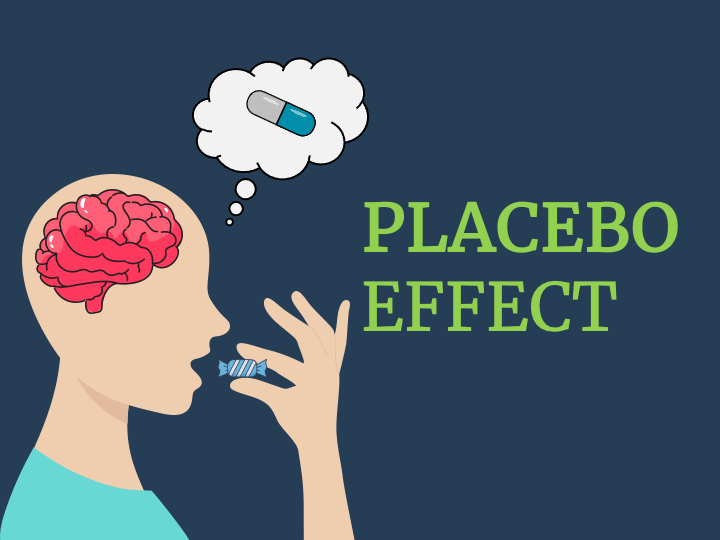Introduction
In clinical trials, the placebo effect presents a formidable challenge.
Placebos, inert substances, or treatments given to control groups, can lead to apparent improvements in symptoms solely through patients' beliefs and expectations, rather than any active pharmacological effect. This phenomenon not only obscures the true efficacy of investigational treatments but also introduces variability into trial results, complicating data interpretation. Furthermore, can inflate perceived treatment benefits, potentially leading to erroneous conclusions about a drug's effectiveness illustrated bydata from 186 randomized controlled trials (16,655 patients) that were extracted from review on placebo interventions [1].
On average, 54% of treatment effect was due to contextual effects, higher with blinded assessor, concealed allocation, increased placebo effect, lower mean age, and more females.
Hence, we'll explore innovative approaches aimed at overcoming the negative impact of the placebo response in clinical trials, enhancing the reliability and validity of trial findings.
1- Randomization
Randomization stands as a foundational principle in clinical trial design, as underscored by the BMC Medical Research Methodology
By randomly assigning participants to either the active treatment or placebo group, study teams introduce an element of chance that helps to mitigate potential biases and reduce the impact of the placebo effect. This method ensures that known and unknown confounding variables are evenly distributed across treatment groups, enhancing the validity of the trial results. Furthermore, randomization helps to maintain the blinding of both participants and site staff including investigator, thereby minimizing the potential for bias in outcome assessments.
By incorporating randomization into trial protocols, study teams can establish a robust framework for evaluating treatment efficacy while effectively addressing the challenge posed by the placebo response.
2- Active placebos
Innovative strategies such as the use of active placebos offer a nuanced approach to managing the placebo response, as advocated by the National Center of Biotechnology for Information (NCB1) [3].
in fact as supported by a clinical trial that evaluated the efficacy of an antidepressant (duloxetine) versus an active placebo in 157 patients with depression [4]. The placebo was designed to mimic the side effects of duloxetine. Nevertheless, the results show a significantly higher remission rate on duloxetine (19%) than on the active placebo (6%). Similarly, the response rate was higher on duloxetine (36%) than placebo (18%). This study demonstrates that a placebo mimicking side effects does not lead to therapeutic improvement compared to the active treatment.This approach helps to preserve blinding among participants and site staff, thereby maintaining the integrity of the trial's double-blind design. By ensuring that participants and study teams remain unaware of whether they are receiving or administering the active treatment or the placebo, active placebos minimize the potential for bias in outcome assessments.
This technique not only enhances the rigor of the trial but also provides a means to distinguish genuine treatment effects from placebo responses, leading to more accurate evaluations of treatment efficacy.
3- Standardization
Standardizing various aspects of the trial context emerges as a pivotal strategy in mitigating the placebo response.
By implementing rigorous protocols across the trial environment, including the appearance of treatments, clinical encounters, and administration procedures, study teams can minimize contextual cues that may trigger a placebo effect.
This standardization ensures consistency across treatment groups, reducing the likelihood of inadvertent differences that could influence participants' perceptions and responses, as emphasized by the Lancet Neurology [3]. Moreover, by creating a uniform trial setting, standardization enhances the reliability and reproducibility of trial outcomes, facilitating more accurate assessments of treatment efficacy.
Implementing rigorous protocols for standardizing the trial context thus represents a crucial step in minimizing the placebo response and strengthening the validity of clinical trial results.
4- Psychoeducation
Psychoeducation emerges as another promising strategy to mitigate the placebo response in clinical trials. By educating participants about the placebo effect, its prevalence in clinical trials, and the importance of providing honest and objective symptom reports, study teams aim to reduce both conscious and unconscious responses to placebos [5]. As evidenced, in a clinical trial with 97 patients with chronic low back pain shows that informing participants about the placebo effect amplifies this effect instead of reducing it: the group informed they were receiving a placebo (explicit) had a 30% pain reduction, versus only 9% reduction in the uninformed placebo group (hidden) (p<0.05) [6].
This enhanced understanding empowers participants to distinguish genuine treatment effects from placebo responses, thereby improving the accuracy of trial data. Furthermore, by fostering a transparent and informed relationship between participants and study teams, psychoeducation promotes trust and engagement in the trial process, further enhancing the reliability of trial outcomes.
Therefore, integrating psychoeducational interventions into trial protocols offers a valuable avenue for reducing the placebo response and improving the accuracy of clinical trial outcomes.
5- Biomarkers
Utilizing objective biomarkers as evaluation criteria presents a promising strategy to overcome the placebo response in clinical trials, by incorporating physiological, biochemical, or imaging biomarkers as objective measures [3].
This approach provides study teams with quantitative data that offer a more nuanced understanding of treatment effects. By relying on these biomarkers, study teams can assess treatment efficacy with greater precision, discerning genuine therapeutic effects from placebo responses more effectively. This objective assessment reduces the susceptibility of trial outcomes to bias or interpretation.
Subjective endpoints, such as patient-reported outcomes, are inherently subjective and can be influenced by various factors, including participant expectations and treatment context. In contrast, objective biomarkers provide an objective and standardized means of measuring treatment effects, thereby enhancing the reliability and validity of trial results.
Furthermore, the use of objective biomarkers offers several advantages over traditional subjective endpoints. Objective biomarkers provide quantifiable and reproducible measures of treatment response, reducing the variability inherent in subjective assessments.
Additionally, objective biomarkers are less susceptible to placebo effects, as they directly measure physiological or biochemical changes rather than relying on participants' perceptions or interpretations.
This enhances the robustness of trial outcomes and enables more accurate evaluations of treatment efficacy.
Conclusion
Clinical trials constantly face the challenge of the placebo response, which can significantly influence study outcomes eg not achieving the primary endpoint. However, by adopting innovative approaches such as randomization, the use of active placebos, standardization of the context, psychoeducation, and the integration of objective biomarkers, study teams can mitigate the impact of the placebo response and strengthen the validity of clinical results. These strategies provide effective means to better control biases and improve the accuracy of treatment efficacy assessments.
By integrating these approaches into the design and implementation of clinical trials, we can progress towards more rigorous research and more reliable outcomes, thus contributing to the advancement of medical knowledge and the improvement of patient care.
References
[1] Placebo interventions for all clinical conditions - Hróbjartsson, A - 2010 | Cochrane Library
[2] A roadmap to using randomization in clinical trials | BMC Medical Research Methodology | Full Text (biomedcentral.com)
[3] Placebos in clinical trials: unravelling a complex phenomenon - The Lancet Neurology
[6] Placebos without Deception: A Randomized Controlled Trial in Irritable Bowel Syndrome | PLOS ONE



